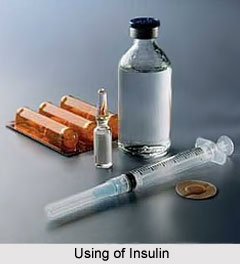 Several factors have been identified so far as the probable causes for Diabetes Mellitus or Madhumeha. Most causes of diabetes are related with improper dietary habits and lifestyle and the causes may vary according to the different types of diabetes. However, there are a few common factors that are found to be responsible for the development of all types of diabetes. Apart from the direct causes, there are also a few risk factors that can indirectly contribute to the development of Diabetes Mellitus or Madhumeha. Knowing the exact cause of the disease helps a lot in choosing the right treatment method for diabetes.
Several factors have been identified so far as the probable causes for Diabetes Mellitus or Madhumeha. Most causes of diabetes are related with improper dietary habits and lifestyle and the causes may vary according to the different types of diabetes. However, there are a few common factors that are found to be responsible for the development of all types of diabetes. Apart from the direct causes, there are also a few risk factors that can indirectly contribute to the development of Diabetes Mellitus or Madhumeha. Knowing the exact cause of the disease helps a lot in choosing the right treatment method for diabetes.
Diabetes Mellitus or Madhumeha is mainly caused due to decreased secretion of insulin from the pancreas that normally helps in transferring glucose from the blood to the cells. Sugar accumulates in the blood in absence of insulin and it is also not converted into energy, as it should. The disease is generally found to be hereditary and people following an improper diet consisting carbohydrates are at a higher risk of being affected by diabetes. The obese people and those who lead a sedentary lifestyle also have a higher risk of developing diabetes compared to others.
The main cause behind the Type 1 Diabetes is destruction of beta cells due to aggressive nature of cells present in the body. The other risk factors that are likely to trigger Type 1 Diabetes include heredity, poor diet (malnutrition) and environment (virus affecting pancreas). It is found that diabetes occurs mostly because there is abnormal secretion of some hormones in blood that act as antagonists to insulin.
Sometimes, certain hereditary or inherited traits can cause Diabetes Mellitus or Madhumeha. However, the risk level of developing diabetes depends upon closeness of one`s blood relationship with his mother and father. It is found that a child has the highest risk of developing diabetes, if both the parents are diabetic. Age is considered one of the causes of diabetes. The risk of diabetes usually increases with age and though the disease may occur at any age, 80% of all diabetes cases have been found in people aged above 50 years.
The Malnutrition-related Diabetes is the type of diabetes that is mainly caused due to poor diet. Improper nutrition, low protein, fiber intake, high intake of refined products, etc. are the common causes for this type of Diabetes Mellitus or Madhumeha. Obesity and fat distribution is another possible cause of diabetes. The body`s insulin resistance increases with weight and may lead to development of diabetes. Sedentary or inactive lifestyle is another probable cause of diabetes. It is found that people leading a sedentary lifestyle are more prone to diabetes, compared to those who exercise thrice a week. Doing exercises thrice a week significantly decreases the risk of developing diabetes.
One of the frequently found causes for Diabetes Mellitus or Madhumeha is stress. Physical injury or emotional disturbance can initiate the development of the disease and any disturbance in Corticosteroid or ACTH therapy may also lead to clinical signs of the disease. Sometimes, a few strephylococci is considered responsible for infection in pancreas and the infection can eventually lead to diabetes. Gender is another common risk factor for diabetes. Diabetes is commonly seen in elderly people, especially males but, its severity is stronger in women. It is also more commonly found in females with multiple pregnancies or who are suffering from (PCOS) Polycystic Ovarian Syndrome. Hypertension and serum lipids and lipoproteins are also considered possible causes for Diabetes Mellitus or Madhumeha.
Apart from the above mentioned causes for diabetes, there are also a few factors that can lead to diabetes. Though these factors are not common, they can cause severe complications. It has been found that some cases of diabetes are caused by the body`s tissue receptors not responding to insulin and this form is quite uncommon. Genetic mutations (autosomal or mitochondrial) may sometimes lead to defects in beta cell function and abnormal insulin action may also have been genetically determined in some cases. Apart from these, any disease that causes extensive damage to the pancreas, such as chronic pancreatitis and cystic fibrosis may also lead to diabetes. In some cases, diseases associated with excessive secretion of insulin-antagonistic hormones are found to cause diabetes as well.
However, most causes for Diabetes Mellitus or Madhumeha can be controlled by following some preventive actions. The preventive actions include avoiding the foods that increase sugar in blood, doing free hand exercises on a regular basis and also leading a controlled and active lifestyle. If one can take these preventive actions properly, he/she can easily avoid diabetes.




















